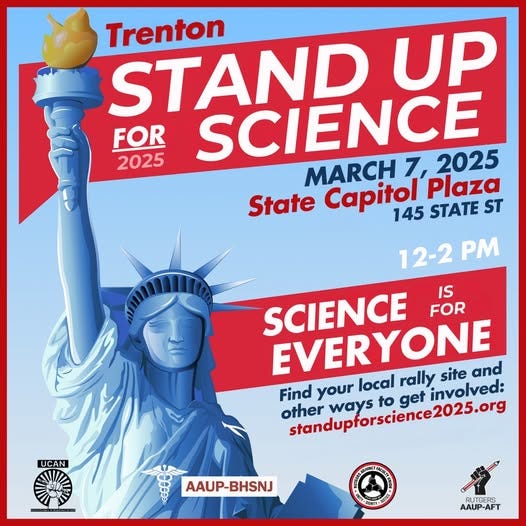Stand Up For Science - remarks in Trenton
Working together for science and democracy
Here’s a draft of my remarks for today’s Stand Up For Science rally at noon in Trenton. Go to a rally near you! -Sam
My name is Sam Wang. I am a neuroscience professor at Princeton University. I also use scientific methods to study democracy. I'm here to help put what I’ve learned to your practical use.
The weird math of elections
The first thing about elections is mathematical: elections distribute power weirdly.
If you win 50% of the vote you get 100% of an office. That includes the Presidency. That means a small change in votes can lead to an enormous change in policies. Donald Trump didn't even get 50% of the vote. Such a small margin can swing back at midterm elections in 2026 - and politicians know it.
Elon Musk didn't get any votes at all. He and his minions are rampaging through government institutions in violation of the law. By holding back money passed by Congress and firing people illegally, he is overthrowing our system of constitutional government from within. This sounds extreme, but it accurately captures most of what we've seen since January 20th, six and a half weeks ago.
Saving the system with federalism
Government can make life better for everyone. Raise your hand if you’ve ever used a weather report. Weather reports are based on government data. That is science and government working together. Elon Musk wants to shut all of that down, and along the way get himself big contracts. That is corruption at the deepest level.
One thing we have left is federalism: the idea that power comes at different levels. That's why it’s important that you are here in Trenton. Go to your state representatives, your governor, your mayor. Even if they are on your side, they don't know what to do. They are as unfamiliar with the current situation as you are.
Republicans are giving up their constitutional power. Democrats are color-coordinating their outfits and holding up little signs at the State of the Union. Schools and universities are afraid of retaliation. And businesses are staying silent.
Everyone is struggling to adapt to the unprecedented circumstances we now face. And many are afraid to stand alone. They need us to push them. Make them do right - and offer your help.
Think of constitutional government like a chess game. When your opponent rolls a grenade onto the board, the correct move is not bishop takes grenade. The correct move is to get the grenade off the board.
Now let’s get to work.
Using science to help get what you want
Science can be used to help you get what you want from politicians. Neuroscience can help you choose what to do, and math can tell you where to do it.
Because of where people live and the way districts are drawn, about one in ten congressional districts are competitive in November 2026. We're lucky because there are several near us: NJ 7th District Thomas Kean Jr., and Pennsylvania’s 1st District Brian Fitzpatrick. They may be afraid of losing their next election. And that gets us to neuroscience. Fear helps the brain learn fast. Tell them to take back their constitutional power over spending. Tell them their careers depend on it.
Fear is bipartisan. Tell your Democratic representatives how angry you are that they are not standing up for science. They have to survive a primary election. Here in New Jersey, we got rid of the anti-competitive County Line primary ballot system. That makes them vulnerable.
The science of mass protest
Now let’s talk about the science of mass protest. In a study of hundreds of social movements, any protest that recruited 3.5% of the population got what it wanted. 3.5% is a lot of people. We are not close to that. But we can join forces with others.
And if we use science to target our efforts, we can punch above our weight. By taking time away from your science today, you will be able to do your science a year from now.
Today, I will use principles from neuroscience to build for you a basic understanding of citizen activism—a skill that many of us are now learning for the first time.
The neuroscience of effective political action
Humans – you, me, politicians, news reporters, and university administrators - are all social and visual primates. Our primate brains respond most strongly to what we can see, especially if it is a direct social interaction.
This principle has practical implications for our activism. For scientists, it means digging deep and finding your inner extrovert.
Emails and petitions are easy to send, but they are not effective. We need to up our game.
Postcards are ok, but phone calls are better. Make a phone call, and help us all up our game.
Phone calls are good, but in-person contact is AMAZING. Go see your representatives in person. Now we have fully upped our game.
Because we are social, a cluster of us is more effective than one of us. Face-to-face interactions create the strongest influence on decision-makers. Go in a group, and go to the local office. You will make more of an impact.
Here is another neuroscience principle: humans are motivated by immediate rewards. Offer them a reward. Offer your expertise and your time. Offer to assist with gathering deleted public health information, or to analyze data, or tell them local stories they can use.
What to do today
Go to the QR code below to sign up:
to approach elected officials in Washington DC. Tell them to protect their constitutional power and our science.
to approach elected officials here in New Jersey. Ask them for help - and offer your help.
Finally, go back to your hometown, and ask your local officials and university leaders to protect foreign scholars and all students.
We are witnessing not merely an assault on science, but on the very idea of the common good. An attack on science is an attack on all of us.
And when people in power fail us, we have to take control. Science and our democracy depend on it.




Sam - INSPIRING job today! I would like to share your point about 3.5% of a population in protest influencing change. Can you point me to sources for this statistic?